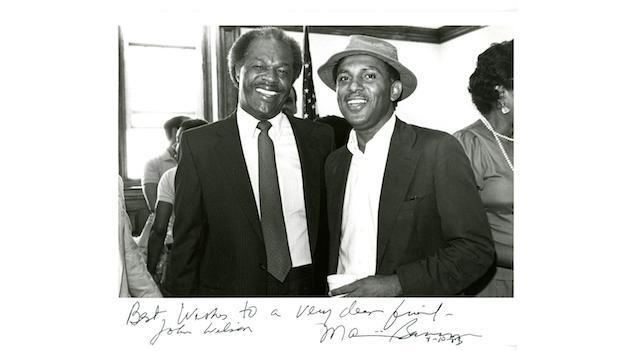|
Early life: John Augustus Wilson was born on September 29, 1943 in Baltimore, Maryland, but from an early age was reared by Laura and Walter Maddox, his maternal grandparents in Princess Anne, Maryland. He graduated from the old Somerset High School, which became Kiah Hall, on the University of Maryland Eastern Shore (UMES) campus. After graduation from high school, he enrolled in the public teachers college for blacks, Bowie State College, now Bowie State University, in Bowie, Maryland. Education: John Wilson’s first attempt to obtain a college education was unsuccessful, so he returned to Princess Anne and enrolled in Maryland State College (MSC), now the UMES, in the spring of 1963, where he majored in physical education. His time at MSC coincided with student protests nationwide. MSC students struggled to achieve equal treatment in Princess Anne when they learned that a desegregation agreement that had been negotiated by the Princess Anne Biracial Committee had been broken. On February 20, 1964, the MSC students were led by John “Johnny” Wilson, and community leaders Warren Morgan, Reverend Autry Cash and Curtis Gentry, went into the town of Princess Anne and sought service at the local restaurants. They were served at all but two restaurants. Civil Rights Activist: On the second day of the protests, a door hinge was strung. On the charge of destruction of property, Johnny Wilson was arrested on the MSC campus by Maryland State Troopers, on the belief that his arrest would end the protests. Contrary to that belief, Wilson’s fellow protestors placed themselves on the street directly in front of the patrol car which prevented the troopers from leaving cam-pus with Wilson. He was released and the police left the campus, but later that day Wilson went to the jail and turned himself in to the authorities. The protestors were committed to nonviolence, but the home of J. Leon Gates, an MSC accountant and Johnny Wilson’s uncle, was bombed, and a cross was burned in view of the campus. The students continued to protest the injustices and were attacked and bitten by police dogs, were beaten by baton wield-ing policemen, were called derogatory names, and were also blasted by high pressured fire hoses. Johnny Wilson was again arrested with nearly 30 other students. The students continued to protest and received support from as far away as Denmark and Austria. Local support came from Gloria Richardson, a civil rights leader from Cambridge, who marched with the students. Other support came from the comedian, author, political activist, Dick Gregory, who arrived in Princess Anne and offered financial and moral support. He proposed a boycott of the town, which was effective because MSC was the major source of profit for Princess Anne, and town, state and government officials took note of that fact. A meeting was arranged for the students to meet with Governor Tawes at the State House in Annapolis. It was ironic that the same State Police who had beaten the students and trained dogs on them had to chauffeur them to and from the meet-ing. At the meeting, the Governor promised that an accommodation act which guaranteed equal access to restaurants, hotels, etc., would extend to the Eastern Shore, and the protests ended. The protests put Johnny Wilson into the eyes of the media. Wilson did not complete his education at MSC. Instead, he left Princess Anne and became involved in the national civil rights movement, and allied himself with the National Association for the Advancement of Colored People (NAACP), and the Student Nonviolent Coordinating Committee (SNCC). Wilson also became close colleagues of Dick Gregory, Malcolm X, Congressman Allen Clayton Powell, Jr., and he work-ed alongside Marion Barry, the future Mayor of Washington, D.C., and future longtime Georgia Congressman John Lewis. Home Rule Charter: In the 1960s, John Wilson became a leading advocate of home rule for Washington, D.C. In 1974, Wilson served as the Chairman of the drive to approve the referendum to adopt the Home Rule Charter for the District of Columbia. The Charter allowed residents for the first time to elect both a mayor and a 13-member City Council called the Council of the District of Columbia. In 1974, Wilson was elected and won a City Council seat on the first D.C. Council. Wilson was a unifier, who brought rich, poor, young and old together. He had the audacity to tell people what he thought, criticized them to their faces regardless of who they were, and somehow they respected him in spite of it. He chaired the Finance Committee of D.C. before he was elected chairman of the Council in 1990. Some members of the city government and assistants of the Mayor’s Office referred to Wilson, “as a wizard in municipal finances.” Wilson believed that the government had to be healthy in order for it to function properly. Political Career: John Wilson served 18 years as an elected official, including two years as a D.C. Council Chairman. He was a champion of the underprivileged and disenfranchised, used his political skill to push through legislation on rent control, child abuse prevention, tax reform, consumer protection and victim rights. He was instrumental in getting legislation passed that included limits on converting rental housing to condominiums, gun control, and expanded medical care for women and children. Wilson also wrote the District’s tough anti-hate crimes laws as well as its human rights laws. For all that he tried to do, John Wilson was considered to have been “one of the most powerful and most popular men in D.C. politics.” Some people even thought he would run for the office of Mayor of D.C. Death: Unfortunately, on May 19, 1993, John A. Wilson was found deceased. His death was ruled a suicide based on the belief of the pressures of the job, a promising political career, possibly personal concerns, coupled with a guarded history of medical concerns, all may have loomed too large. His untimely death shocked everyone because he was described as a beacon of hope for everyone as he tried to improve the lives of others. In 1994, the District of Columbia municipal government building was named in his honor. A private drive off Backbone Road at the edge of UMES bears the name of “John Wilson Lane.” UMES also has two scholarship funds named in his honor. Therefore, John A. Wilson’s legacy lives through scholarships to help educate others. However, on a grand scale, according to John Wilson’s former math professor and President of UMES, Dr. William P. Hytche, “his [Wilson’s] legacy lies in his desire to make life better for other people.”
0 Comments
Leave a Reply. |
Archives
July 2024
Categories |


 RSS Feed
RSS Feed
